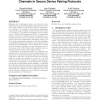Free Online Productivity Tools
i2Speak
i2Symbol
i2OCR
iTex2Img
iWeb2Print
iWeb2Shot
i2Type
iPdf2Split
iPdf2Merge
i2Bopomofo
i2Arabic
i2Style
i2Image
i2PDF
iLatex2Rtf
Sci2ools
117
click to vote
SOUPS
2009
ACM
2009
ACM
Usability and security of out-of-band channels in secure device pairing protocols
Initiating and bootstrapping secure, yet low-cost, ad-hoc transactions is an important challenge that needs to be overcome if the promise of mobile and pervasive computing is to be fulfilled. For example, mobile payment applications would benefit from the ability to pair devices securely without resorting to conventional mechanisms such as shared secrets, a Public Key Infrastructure (PKI), or trusted third parties. A number of methods have been proposed for doing this based on the use of a secondary out-of-band (OOB) channel that either authenticates information passed over the normal communication channel or otherwise establishes an authenticated shared secret which can be used for subsequent secure communication. A key element of the success of these methods is dependent on the performance and effectiveness of the OOB channel, which usually depends on people performing certain critical tasks correctly. In this paper, we present the results of a comparative usability study on metho...
Related Content
| Added | 28 May 2010 |
| Updated | 28 May 2010 |
| Type | Conference |
| Year | 2009 |
| Where | SOUPS |
| Authors | Ronald Kainda, Ivan Flechais, A. W. Roscoe |
Comments (0)

